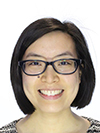
Contributions
Abstract: EP1611
Type: ePoster
Abstract Category: Pathology and pathogenesis of MS - 25 Biomarkers
Background: Neuromyelitis optica (NMO) is an inflammatory and demyelinating auto-immune disease of the central nervous system. Subgroups of NMO patients have been identified, including anti-AQP4 seropositive and anti-AQP4 seronegative patients. We aim to gain insight in the pathophysiology of NMO, in patients with and without anti-AQP4 antibodies, using CSF proteomic analysis.
Methods: CSF was enzymatically digested and analysed by high resolution mass spectrometry (Orbitrap QX+) after separation using a 90 minute LC gradient on a C18 column. The resulting spectra were analysed using specialized software (Progenesis LC-MS) and differentially abundant proteins between the groups were identified. Subsequently the differentially abundant proteins were submitted to Ingenuity Pathway Analysis (IPA) for assessment of their connection and roles in biological pathways that might be relevant to disease pathology.
Results: CSF of 12 anti-AQP4 positive NMO patients and 16 anti-AQP4 negative patients were available and analysed. The anti-AQP4 group consisted of more females (75% vs 52%) and were older at onset (median 46 years vs median 38 years). In total, we identified 6595 peptides belonging to 725 proteins, with a peptide false discovery rate (FDR) of 0.02% and a protein FDR of 0.8%. These proteins were analysed with stringent criteria to detect the significantly differentially abundant proteins between the groups. Six proteins were significantly higher in abundance in the AQP4-ab positive patients than in the APQ4-ab negative patients. These proteins are involved in biological processes, including neurogenesis, synaptogenesis, cell adhesion properties and cell proliferation.
Conclusion: This preliminary data shows that the CSF proteome of anti-AQP4 positive patients has higher abundance for six proteins involving in neuro-regenerative processes. Further analyses are needed to confirm these findings.
Disclosure:
Yu Yi Wong: nothing to disclose
Marcel Stoop: nothing to disclose
Roos van der Vuurst de Vries: nothing to disclose
Christoph Stingl: nothing to disclose
Theo Luider: nothing to disclose
Bernard Hemmer: has served on scientific advisory boards for F. Hoffmann-La Roche Ltd, Novartis, Bayer AG, and Genentech; he has served as DMSC member for AllergyCare; he or his institution have received speaker honoraria from Biogen Idec, Teva Neuroscience, Merck Serono, Medimmune, Novartis, Desitin, and F. Hoffmann-La Roche Ltd; his institution has received research support from Chugai Pharmaceuticals and Hoffmann-La-Roche; holds part of two patents; one for the detection of antibodies and T cells against KIR4.1 in a subpopulation of MS patients and one for genetic determinants of neutralizing antibodies to interferon β.
Rogier Hintzen: Received honoraria for serving on advisory boards for Biogen Idec, Roche, Sanofi. He participated in trials with BiogenIdec, Merck-Serono, Roche, Genzyme and Novartis
Abstract: EP1611
Type: ePoster
Abstract Category: Pathology and pathogenesis of MS - 25 Biomarkers
Background: Neuromyelitis optica (NMO) is an inflammatory and demyelinating auto-immune disease of the central nervous system. Subgroups of NMO patients have been identified, including anti-AQP4 seropositive and anti-AQP4 seronegative patients. We aim to gain insight in the pathophysiology of NMO, in patients with and without anti-AQP4 antibodies, using CSF proteomic analysis.
Methods: CSF was enzymatically digested and analysed by high resolution mass spectrometry (Orbitrap QX+) after separation using a 90 minute LC gradient on a C18 column. The resulting spectra were analysed using specialized software (Progenesis LC-MS) and differentially abundant proteins between the groups were identified. Subsequently the differentially abundant proteins were submitted to Ingenuity Pathway Analysis (IPA) for assessment of their connection and roles in biological pathways that might be relevant to disease pathology.
Results: CSF of 12 anti-AQP4 positive NMO patients and 16 anti-AQP4 negative patients were available and analysed. The anti-AQP4 group consisted of more females (75% vs 52%) and were older at onset (median 46 years vs median 38 years). In total, we identified 6595 peptides belonging to 725 proteins, with a peptide false discovery rate (FDR) of 0.02% and a protein FDR of 0.8%. These proteins were analysed with stringent criteria to detect the significantly differentially abundant proteins between the groups. Six proteins were significantly higher in abundance in the AQP4-ab positive patients than in the APQ4-ab negative patients. These proteins are involved in biological processes, including neurogenesis, synaptogenesis, cell adhesion properties and cell proliferation.
Conclusion: This preliminary data shows that the CSF proteome of anti-AQP4 positive patients has higher abundance for six proteins involving in neuro-regenerative processes. Further analyses are needed to confirm these findings.
Disclosure:
Yu Yi Wong: nothing to disclose
Marcel Stoop: nothing to disclose
Roos van der Vuurst de Vries: nothing to disclose
Christoph Stingl: nothing to disclose
Theo Luider: nothing to disclose
Bernard Hemmer: has served on scientific advisory boards for F. Hoffmann-La Roche Ltd, Novartis, Bayer AG, and Genentech; he has served as DMSC member for AllergyCare; he or his institution have received speaker honoraria from Biogen Idec, Teva Neuroscience, Merck Serono, Medimmune, Novartis, Desitin, and F. Hoffmann-La Roche Ltd; his institution has received research support from Chugai Pharmaceuticals and Hoffmann-La-Roche; holds part of two patents; one for the detection of antibodies and T cells against KIR4.1 in a subpopulation of MS patients and one for genetic determinants of neutralizing antibodies to interferon β.
Rogier Hintzen: Received honoraria for serving on advisory boards for Biogen Idec, Roche, Sanofi. He participated in trials with BiogenIdec, Merck-Serono, Roche, Genzyme and Novartis


